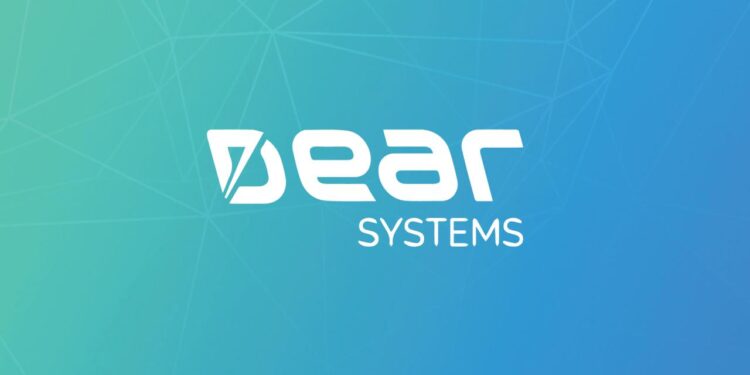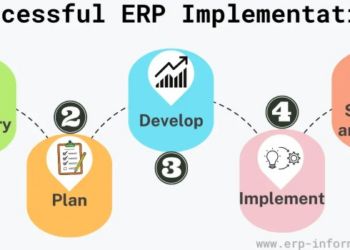Embark on a journey through the realm of Dear ERP, where modern businesses find innovative solutions and enhanced efficiency. Discover how ERP systems revolutionize industries and streamline operations for optimal performance.
Importance of ERP Systems
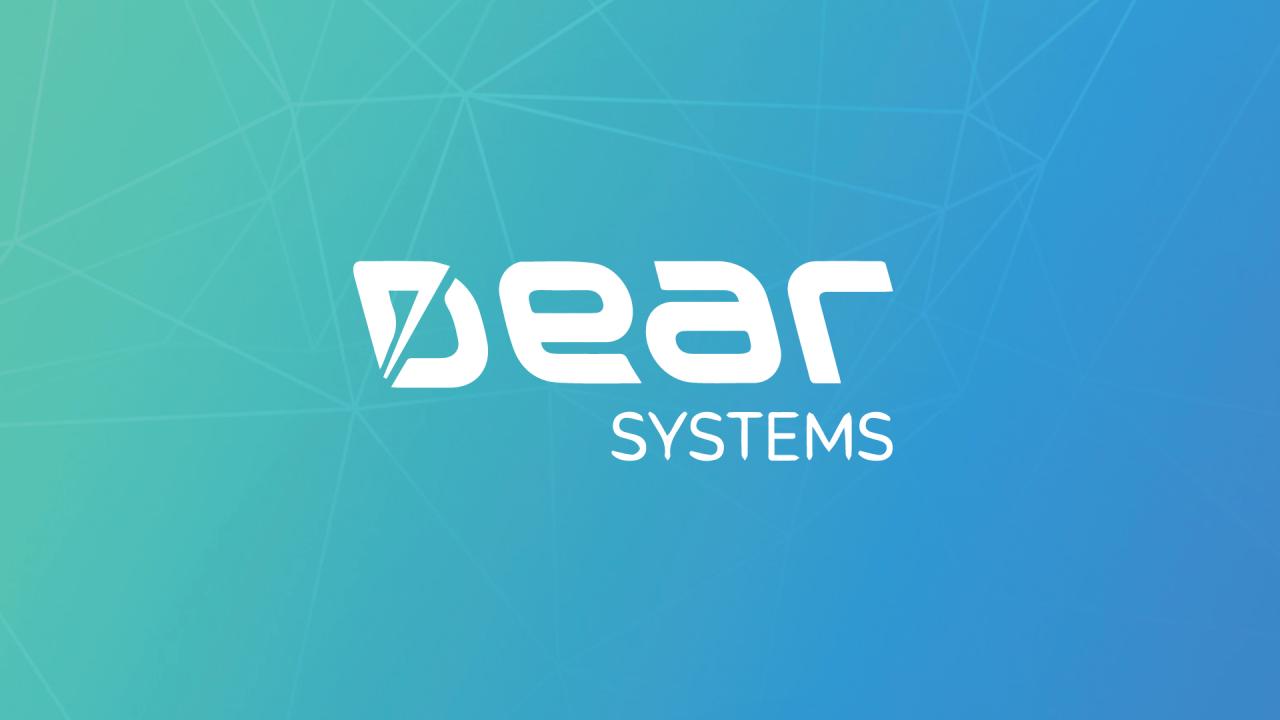
Enterprise Resource Planning (ERP) systems play a crucial role in modern businesses by integrating various functions and departments into a single system. This allows for better coordination, communication, and decision-making across the organization.
Streamlining Processes and Improving Efficiency
One of the key benefits of ERP systems is their ability to streamline processes and improve efficiency. By automating repetitive tasks, reducing manual data entry, and providing real-time information, ERP systems enable companies to operate more smoothly and effectively.
- ERP systems help in inventory management by tracking stock levels, orders, and deliveries, ensuring optimal levels of inventory to meet customer demands.
- Financial management is also enhanced through ERP systems, with features like accounting, budgeting, and forecasting integrated into a single platform for better financial control.
- HR functions such as payroll, benefits administration, and employee performance tracking are streamlined through ERP systems, leading to improved workforce management.
Examples of Industries Benefiting from ERP Implementation
Various industries have seen significant improvements in their operations and profitability through the implementation of ERP systems.
- The manufacturing industry has greatly benefited from ERP systems by optimizing production processes, reducing lead times, and improving product quality.
- Retail companies have improved their supply chain management, inventory control, and customer service with the help of ERP systems, leading to increased customer satisfaction and loyalty.
- In the healthcare sector, ERP systems have enhanced patient care, streamlined administrative tasks, and improved regulatory compliance, ultimately leading to better healthcare outcomes.
Key Features of ERP

ERP systems come with a variety of key features that help businesses streamline their operations and improve efficiency. These features typically include:
Integration of Various Business Functions
ERP systems are designed to integrate different business functions such as finance, human resources, supply chain management, and more into a single, cohesive platform. This integration allows for better communication and collaboration between departments, leading to improved decision-making and overall productivity.
Real-Time Data Analysis
ERP systems provide real-time data analysis capabilities, allowing businesses to make informed decisions quickly. With access to up-to-date information on various aspects of the business, managers can respond promptly to changes in the market and optimize their operations accordingly.
Automation of Routine Tasks
One of the key features of ERP systems is the automation of routine tasks such as data entry, report generation, and inventory management. By automating these processes, businesses can reduce the risk of errors, save time, and free up employees to focus on more strategic tasks.
Scalability and Flexibility
ERP systems are designed to be scalable and flexible, allowing businesses to adapt to changing needs and growth. Whether a company is a small start-up or a large corporation, an ERP system can be tailored to meet their specific requirements and grow with them as their business expands.
Cloud-Based vs. On-Premise Solutions
When it comes to choosing an ERP system, businesses have the option of selecting a cloud-based or on-premise solution. Cloud-based ERP systems offer the advantage of accessibility from any location with an internet connection, while on-premise solutions provide greater control and customization options.
Ultimately, the choice between the two depends on the specific needs and preferences of the business.
ERP Implementation Process
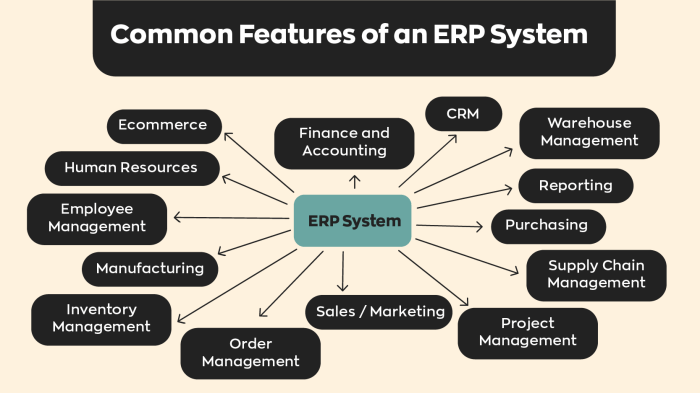
Implementing an ERP system is a complex and crucial process for any organization. It involves several steps to ensure a successful deployment and integration across all departments.
Steps in ERP Implementation
- Planning and Strategy: Define objectives, scope, and budget for the ERP project.
- Selection of ERP System: Research and choose the right ERP solution that aligns with the organization's needs.
- Data Migration: Transfer existing data to the new ERP system while ensuring accuracy and consistency.
- Customization and Configuration: Tailor the ERP software to meet specific business processes and requirements.
- Testing: Conduct thorough testing to identify and resolve any issues before going live.
- Training: Train employees on how to use the new ERP system effectively.
- Go-Live and Evaluation: Launch the ERP system and monitor its performance to make any necessary adjustments.
Challenges in ERP Implementation
- Resistance to Change: Employees may be reluctant to adopt new processes and technologies.
- Data Security Risks: The migration of sensitive data poses security threats if not handled properly.
- Integration Issues: Ensuring seamless integration with existing systems can be challenging.
- Budget and Time Constraints: ERP projects often exceed initial budgets and timelines.
Best Practices for Successful ERP Deployment
- Executive Sponsorship: Secure top-level support and involvement to drive the project forward.
- Clear Communication: Keep all stakeholders informed throughout the implementation process.
- Change Management: Address resistance to change through training and support programs.
- Data Quality Assurance: Ensure data accuracy and consistency during the migration process.
- Continuous Improvement: Monitor and evaluate the ERP system post-implementation for ongoing enhancements.
Customization and Integration
Customization and integration are crucial aspects of ERP systems that help businesses tailor the software to their specific needs and seamlessly connect it with other applications.
Importance of Customization
Customization in ERP systems allows businesses to modify the software according to their unique processes, workflows, and requirements. This ensures that the ERP system aligns perfectly with the organization's operations, maximizing efficiency and productivity.
- Customizing modules: Companies can choose which modules they want to include in their ERP system based on their industry, size, and goals. For example, a manufacturing company may focus on inventory and supply chain management modules, while a service-based company may prioritize CRM and project management modules.
- Configuring workflows: ERP systems can be customized to automate and streamline specific workflows within the organization. This could involve setting up approval processes, notifications, or alerts to ensure timely actions and decision-making.
- Adapting reports: Businesses can customize the reporting features of ERP systems to generate insights and analytics that are relevant to their operations. They can create custom reports, dashboards, and KPIs to track performance and make data-driven decisions.
Integration with Other Software Applications
Integrating ERP with other software applications is essential for ensuring a seamless flow of data and information across the organization. This enables different systems to work together cohesively and eliminates the need for manual data entry and reconciliation.
- API integration: ERP systems can be integrated with other applications using APIs (Application Programming Interfaces) to facilitate real-time data exchange. For example, integrating ERP with CRM software allows sales data to be automatically updated in both systems.
- Third-party integrations: Businesses can leverage third-party integration platforms to connect their ERP system with a wide range of applications such as e-commerce platforms, marketing tools, or payroll systems. This enhances the functionality of the ERP system and improves overall business operations.
- Data synchronization: Integration ensures that data is synchronized across all connected systems, preventing discrepancies and ensuring data consistency. This allows employees to access accurate and up-to-date information whenever needed.
Closing Notes
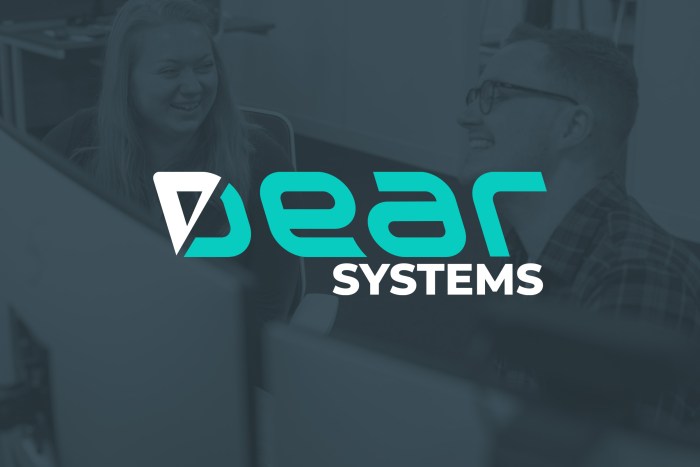
In conclusion, Dear ERP offers a gateway to improved business processes, customized solutions, and seamless integration. Dive into the world of ERP with Dear ERP and unlock the potential for growth and success in your organization.
Essential Questionnaire
How can ERP systems benefit modern businesses?
ERP systems enhance efficiency, streamline processes, and provide valuable insights for informed decision-making.
What are the key features of ERP systems?
Essential features include finance management, HR integration, supply chain optimization, and real-time data access.
What challenges do organizations face during ERP implementation?
Common challenges include data migration issues, employee resistance, and integration complexities.
Why is customization important in ERP systems?
Customization allows ERP systems to adapt to specific business needs, ensuring optimal performance and tailored solutions.

